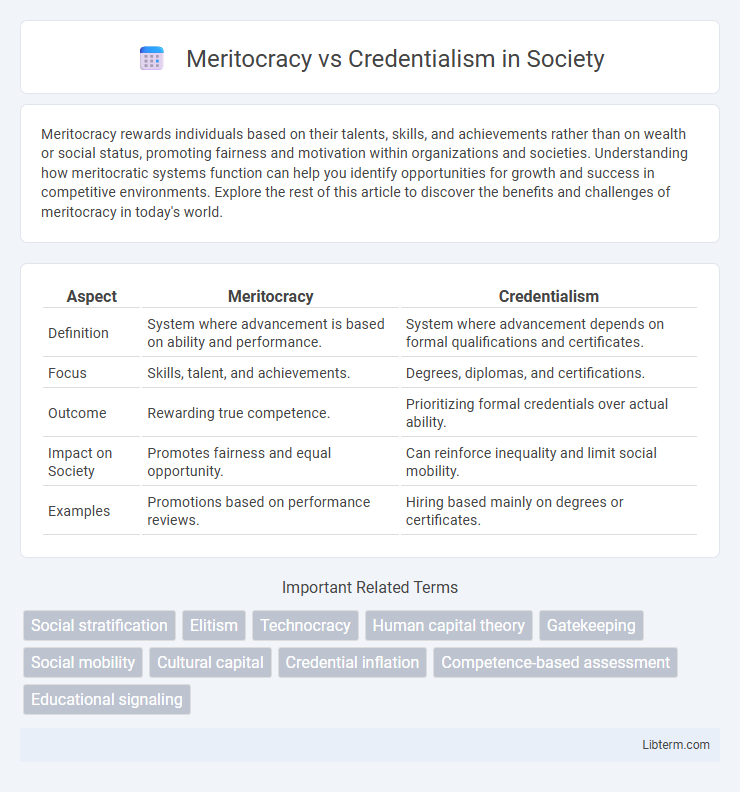Meritocracy rewards individuals based on their talents, skills, and achievements rather than on wealth or social status, promoting fairness and motivation within organizations and societies. Understanding how meritocratic systems function can help you identify opportunities for growth and success in competitive environments. Explore the rest of this article to discover the benefits and challenges of meritocracy in today's world.
Table of Comparison
| Aspect | Meritocracy | Credentialism |
|---|---|---|
| Definition | System where advancement is based on ability and performance. | System where advancement depends on formal qualifications and certificates. |
| Focus | Skills, talent, and achievements. | Degrees, diplomas, and certifications. |
| Outcome | Rewarding true competence. | Prioritizing formal credentials over actual ability. |
| Impact on Society | Promotes fairness and equal opportunity. | Can reinforce inequality and limit social mobility. |
| Examples | Promotions based on performance reviews. | Hiring based mainly on degrees or certificates. |
Understanding Meritocracy: Principles and Practice
Meritocracy operates on the principle that individuals advance based on their abilities, skills, and performance, promoting fairness and efficiency in organizational and social contexts. This system rewards talent and effort, minimizing biases related to socioeconomic background or connections. In practice, meritocracy emphasizes objective evaluations such as performance metrics, exams, and demonstrable achievements to identify and promote the most capable individuals.
What Is Credentialism? Defining the Phenomenon
Credentialism describes the overemphasis on formal qualifications such as degrees and certificates as the primary criteria for job eligibility, often overshadowing actual skills and experience. This phenomenon leads organizations to prioritize academic credentials over practical competencies, thereby affecting hiring decisions and career advancement. It reflects broader societal trends where educational certificates are seen as essential markers of ability and status, sometimes limiting opportunities for those without formal qualifications despite possessing relevant expertise.
Historical Evolution of Meritocracy and Credentialism
Meritocracy originated during the Enlightenment era, emphasizing individual talent and effort as criteria for social advancement, while credentialism gained prominence in the 20th century as formal qualifications increasingly dictated job eligibility and social status. Historically, meritocracy sought to dismantle aristocratic privilege by promoting merit-based progression in education and governance, whereas credentialism institutionalized standardized credentials as gatekeepers in professional and academic fields. The evolution reflects shifting societal values from intrinsic merit and competence to externally validated certifications that often shape economic mobility and labor market dynamics.
Core Differences: Meritocracy vs Credentialism
Meritocracy emphasizes individual talent, skills, and achievements as the basis for advancement and rewards, promoting fairness through measurable performance. Credentialism prioritizes formal qualifications and educational certificates over actual ability, often valuing status symbols like degrees more than competence. The core difference lies in meritocracy's focus on demonstrated merit, while credentialism relies heavily on institutional endorsements and credentials as gatekeepers.
The Role of Education in Shaping Merit and Credentials
Education serves as a critical mechanism in shaping merit by fostering skills, knowledge, and critical thinking that reflect an individual's capabilities and potential. Credentialism emphasizes the possession of formal qualifications, such as degrees and certificates, often prioritizing them over actual competence or performance. The interplay between meritocracy and credentialism highlights the evolving significance of educational credentials in legitimizing merit, impacting employment, social mobility, and economic opportunities.
Impact on Workplace Recruitment and Promotion
Meritocracy emphasizes skills, performance, and demonstrated abilities as primary criteria for workplace recruitment and promotion, fostering a culture of competence and efficiency. Credentialism prioritizes formal qualifications and degrees, often limiting opportunities for capable candidates without traditional educational backgrounds. This dynamic influences diversity and innovation within organizations by shaping how talent is identified and advanced.
Social Equity: Which Model Delivers Fairer Outcomes?
Meritocracy promotes social equity by rewarding individuals based on talent and effort, fostering equal opportunities regardless of background. Credentialism often reinforces social disparities as access to educational qualifications can be influenced by socioeconomic status, limiting fair competition. Empirical studies highlight meritocratic systems as more effective in delivering equitable outcomes by prioritizing actual abilities over formal certificates.
Criticisms and Limitations of Both Systems
Meritocracy faces criticism for reinforcing social inequalities by privileging those with access to better resources, often overlooking systemic barriers that limit equal opportunity. Credentialism is criticized for emphasizing formal qualifications over actual skills and competence, leading to credential inflation and workforce inefficiencies. Both systems risk perpetuating exclusion and failing to fully recognize diverse talents and experiences beyond standardized measures.
Case Studies: Real-World Examples and Comparisons
Case studies of meritocracy and credentialism reveal contrasting outcomes in sectors such as education and corporate hiring, with meritocratic systems like Google's skills-based assessments promoting innovation and diversity. In contrast, credentialism is prominent in traditional professions like law and medicine, where formal degrees and certifications serve as gatekeepers ensuring standardization but often limiting socioeconomic mobility. Comparative analyses show that while meritocracy values performance and potential, credentialism emphasizes formal qualifications, impacting access to opportunities and organizational culture.
Navigating the Future: Blending Merit and Credentials
Navigating the future requires a balanced approach that integrates meritocracy's emphasis on individual ability and performance with credentialism's focus on formal qualifications and certifications. Organizations benefit from blending practical skills assessment and real-world achievements with verified educational credentials to build competent, adaptable workforces. This hybrid model fosters innovation and inclusivity while maintaining standards, ensuring that talent development aligns with rapidly evolving industry demands.
Meritocracy Infographic

 libterm.com
libterm.com